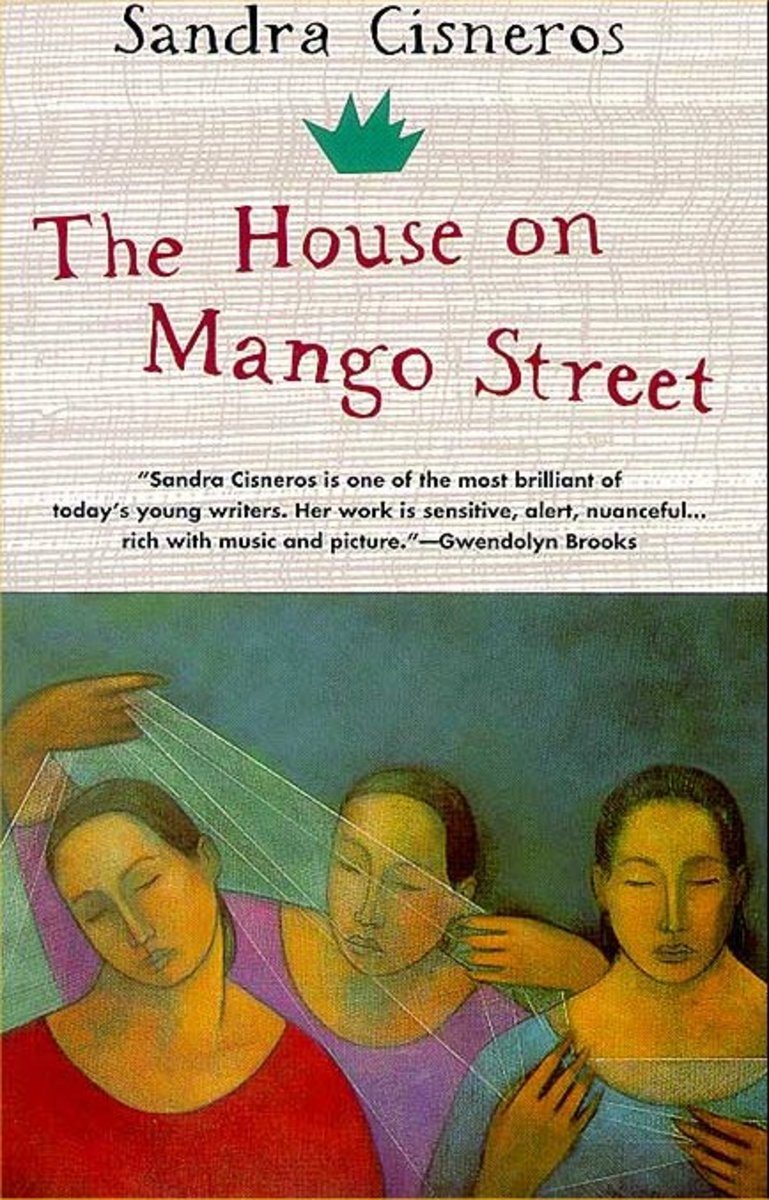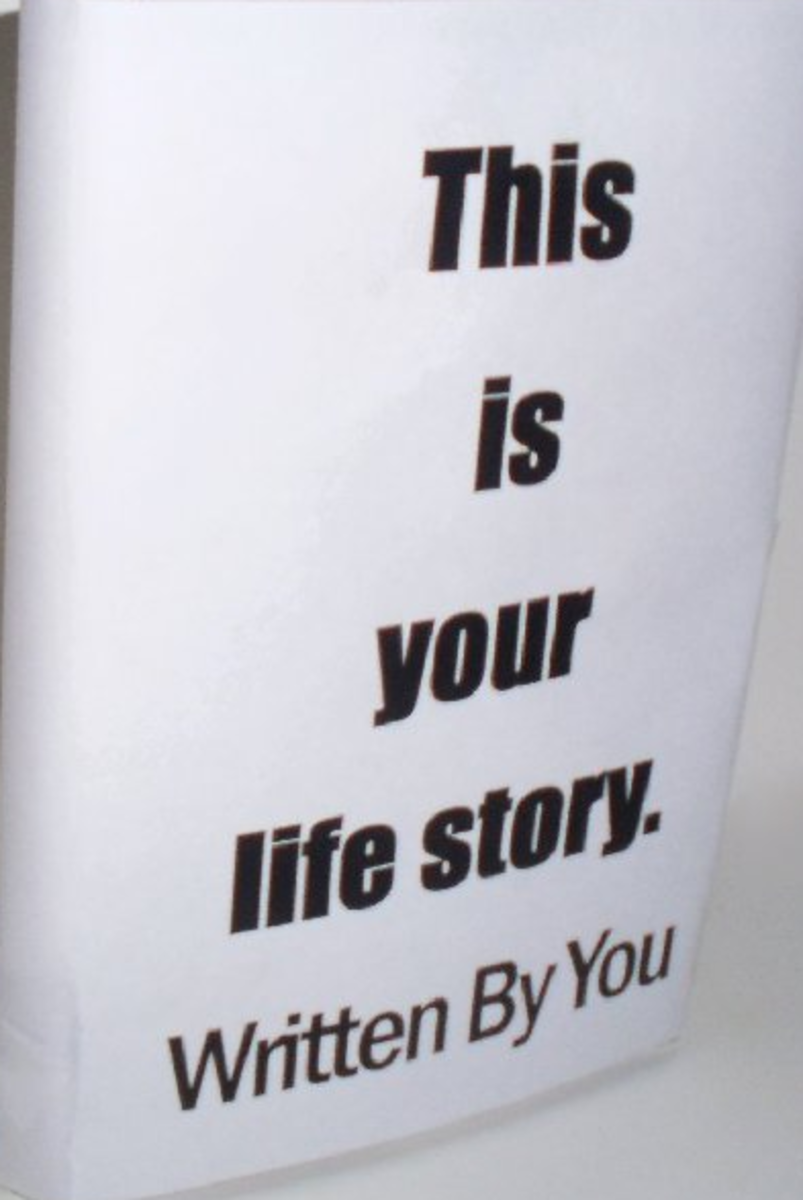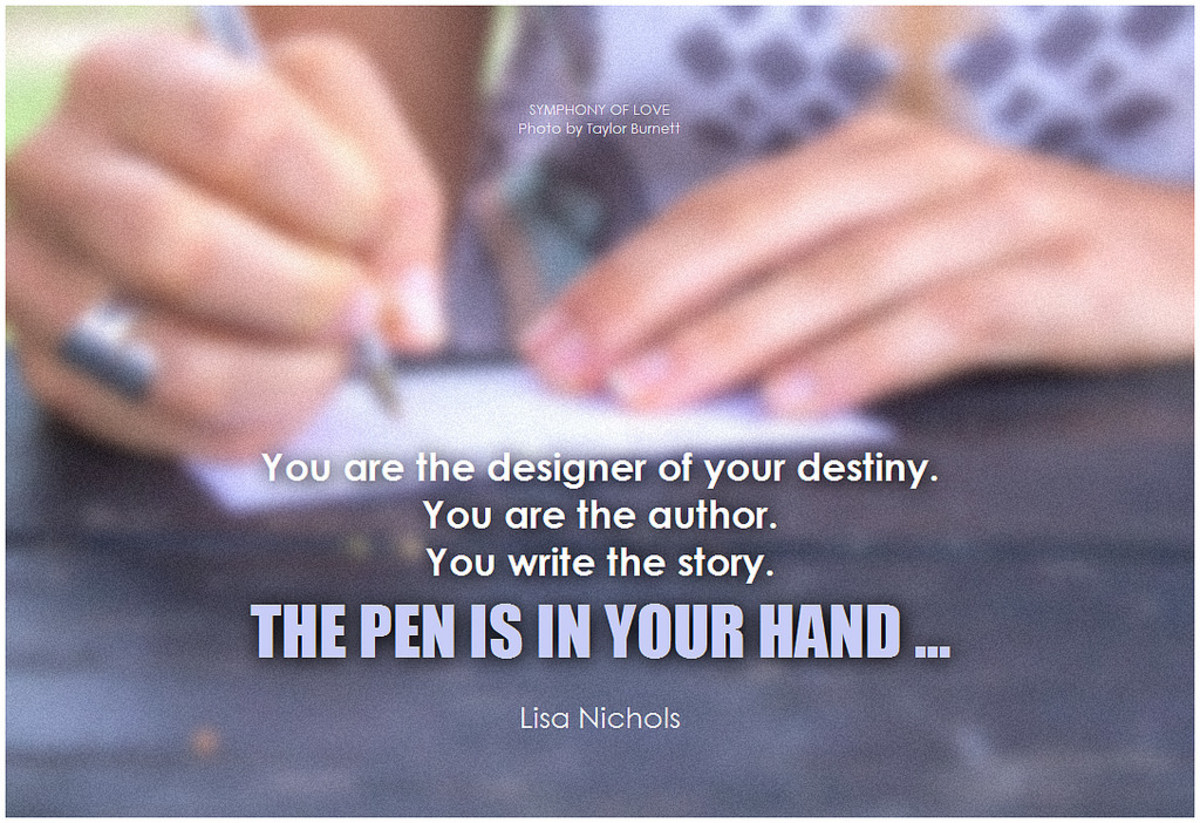How to: Creative Writing Tips 3: Relationship
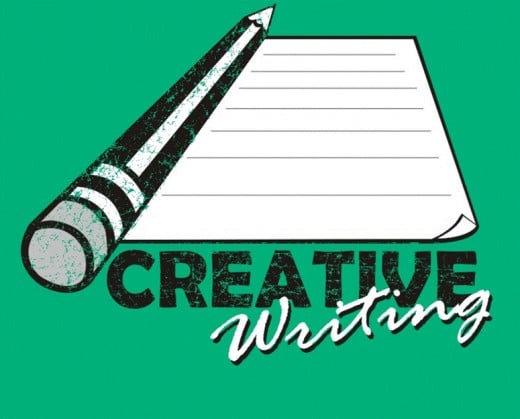

Peas and Carrots!
Welcome to the third installment of the "How To: Tips on Creative Writing" series. By now you have already accustomed yourself with the Introduction, Getting Started, and Grammar installments of this "How To" publication on creative writing. If you have not yet read these previous articles then it is strongly suggested you stop reading and start with the Introduction to this course. Links are at the end of each article navigating you to the next.
This article will focus on the very important intangible that many authors take for granted: Building and Maintaining a Relationship. It might be that these authors do not quite understand the value of this topic, or perhaps have never been taught, or even made aware of this all important asset. Whatever the case, be it known that this is by far one of the most important aspects of the writing process and to not fully grasp the implications could be detrimental to your writing. Understanding and utilizing this tool will surely place you- as an author- on a higher level and improve your writing. For any author trying to establish a base audience, understanding and implementing this tool is just as important in writing as is writing with perfected grammar.
You will recall in the last lesson, Grammar, the importance of the reader to be able to read without interruption due to grammatical mistakes. We, as authors agreed that we have an obligation to our readers to be able to write consistently accurate sentences, paragraphs and pages. We declared that we would exhaust every resource available in an effort to please our audience grammatically. We acknowledged that while they may not like what they read, they will be able to coherently read it! The truth is, writing with correct grammar was a stepping stone to today's lecture. As this series progresses you will see the word "relationship" sprinkled throughout-it's that important. On the cusp, one might assume the relationship I am deeming so important is that of the author to the reader, but I, as your General (I got promoted!) in this war on better writing doth declare to you that this is not the relationship I speak of. 'Tis not the relationship between you and your reader, but 'tis the relationship betwixt your reader and your words. You are but a vessel with prodigious talent in which these words rely upon to stretch to the eye of your audience. We will hone that talent today by learning about this relationship in which we will invest, and as always, we will get to the heart of the matter.

It is time my fellow Generals and Captains of the Legion! It is time for us to gather our troops and dig deep into the muddy trenches. We will sludge through without hesitation the mush of our enemy woodlands. Our foothold will get weak but we shall not surrender. This is a different kind of battle, but I assure you once we have prevailed - and YES! We will prevail- we will taste the sweetest of victories and reign triumphant! Our vast multitude of soldiers have sharpened their edges and our battle cry shall strike reverence at the enemy's marrow. This battle will be but a short one, for we are fully trained and too powerful to succumb. Assembled we cannot be removed; together our weary heads will rest peacefully upon the morrow having savored the sugary delight of victory that is just within our reach!
How do you feel? Think about that for a moment.
Are you excited to keep reading? Did you enjoy visualizing yourself in an Army of fellow comrades fighting against the perils of lame writing? Did you feel important because you are part of a class that is partaking in this journey with you? How does it feel to be included in the Army I've written about? To know that your feet are stained with mud but your head is held high and that inexplicably you know two things about this "war":
1) your fellow soldiers will not let you fail
2) you know that you will win
How do you know those two points?
If, and I hope you do, you feel excited, anxious, ambitious etc. to keep reading, then I have started building a relationship with you. This installment is about that relationship. How to build it, how to maintain it and what can happen if you don't attempt to have a relationship with your reader. Let us first explore how to build the relationship and then let's get to the heart of the matter and explore WHY it is so very vital to build, maintain and nurture that relationship. Do not get this relationship confused with a hook. It is NOT a hook I speak of and as you read further that will become apparent.
If you are reading this then you, my friend, are smarter than the average bear. Whether you agree with everything contained in this series or you completely dismiss everything as trivial is really of no consequence when comes to the fact that JUST because you are reading this is a tell-tale sign that your intellect is statistically higher than most of your friends. Chances are, you are the smartest person you know. Chances are, you are reading this because you want to learn. You either want to learn something new, or, you want to learn "what not to do" and dismiss me as an author- so as not to waste your time in the future by reading my ramblings. Either way you are educating yourself and for arguments sake, I am hoping that I do your time justice and that your decision ultimately becomes the former and not the latter. In any case, I would like to thank you, my good and faithful audience for your devotion and commitment. I implore you to be lenient in your role as jury.
I did it again.
Sneaky aren't I?
Have you seen similar words to the above throughout this series? But truthfully, I did mean everything written in the above paragraph and believe that by virtue of you reading this you are indeed smarter than the average bear. Higher intellect is something that humans crave. We all want to be faster, stronger, better, smarter. Some desire these traits more-so than others and many pursue activities that will help them achieve or improve these traits. It is human nature to want to be the best. Not because we are egotistically swollen, and surely not because we want to be "better" than anyone else. Pursuit of being the "best" is a natural human inclination due to self preservation. We are programmed to believe that in order to survive we must be the best, the strongest, the fastest, the smartest. As we age, and as our experience grows our intellect tells us we no longer have to be the fastest, or the strongest to survive but it certainly does help to be the smartest. In other words, a higher intelligence is something we, as humans, always strive for and never stop pursuing. We have an innate ability to learn languages, algorithms, equations, space, theories, psychologies etc. and because our race, creed, heritage, or culture cannot affect this ability, we all appeal to learning whatever is of interest to us. Furthermore, praise and receiving praise is a human condition that we all yearn for and require. Receiving praise that we are smart -especially from respected colleagues and friends- is one the highest motivating factors to excel and continue doing what we were doing. Knowing this bit of psychology can help an author build an actual relationship between he and his reader. For if the author exclaims that his reader is smart and affirms this throughout, then the reader will want to keep reading.
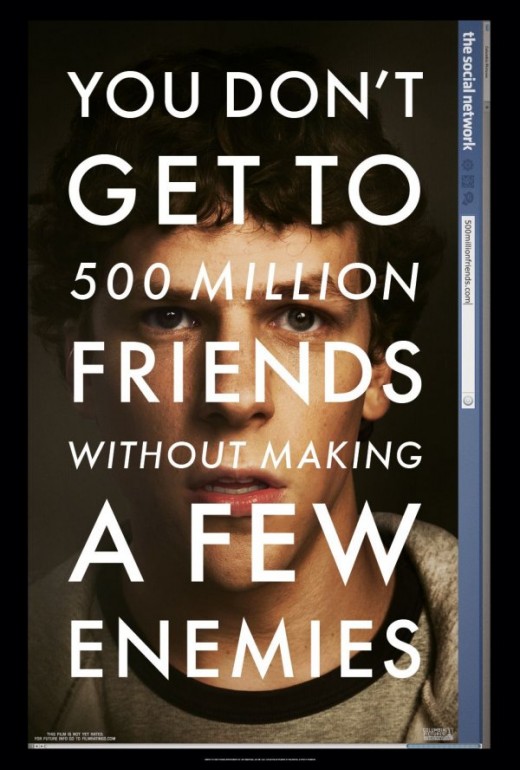
The Social Network
I was watching the Golden Globes in early 2011, and noticed (and appreciated) something the young actor Jesse Eisenburg said. You will recall that Eisenburg played the role of Facebook Founder Mark Zuckerberg in the movie "The Social Network". Before I touch on what he said as he accepted the award, I want to take you to a moment in my life prior to watching those awards. It was the moment I was walking out of the theatre having just seen the movie, "The Social Network". Now, I am an avid movie goer and watcher and almost always to a fault, I am very critical of them and find very few that hold up to what I would deem as a "good" movie. This is prominently because the writer in me is always trying to predict the ending -and if I can, I am not pleased and often think, "I would have written it this way or that way". However, after leaving the movie, "The Social Network", I can proclaim that I felt exhilarated and inspired. It wasn't until the moment that Eisenburg was on the stage that I realized WHY I liked the movie so much -after all, I knew going into the theatre how the movie was surely going to end.
Fast forward to the Golden Globes. The cast is on the stage and Eisenburg is holding the trophy waiving it in the air to the roar of the crowd he says, "... and thank you [director] for knowing that our audience was smart enough to understand [the movie]”. It was then that I had a flashback to walking out of that movie and feeling smart, feeling like I could take on the world, feeling inspired and courageous. The fact that he acknowledged it on National TV, made me wonder, "Do other directors not think we are smart enough to understand structure, theme, plot, character, details? Do the other directors not make the movie challenging enough for us to appreciate? And is this the reason why I do not enjoy most movies?" As I pondered these questions I recanted the many movies I had seen over the years and came to the conclusion that this was probably one of the reasons I did not enjoy them. I don't need every detail explained to me. Rather, let me see the details and discern for myself (which means I am capable). This truth rings even truer for an author of the written page. Write in a way so that we can see the details and then let us discern them on our own- using our own intelligence.
The how...
So how does an author achieve this relationship? Truth is, I've taught this principle of creative writing for decades but it wasn't until I made that connection watching the Golden Globes did I realize it also rang true for the moving pictures. A successful author knows he has to build a relationship with his audience. A successful author knows that a key ingredient to building that relationship is appealing to the intellect of the reader and/or drawing them in emotionally. (The emotional aspect of this relationship will be discussed when we cover Character development.) A successful author will establish a relationship with his reader by making the reader feel smart. A successful author will do this without the reader ever realizing what has happened. If that reader walks away feeling intrigued then the author has built a promising relationship. It is then the author's responsibility to ensure the relationship stays genuine and sincere (truth in writing will be covered in a later installment).
Ask yourself, why do you keep reading this series? I could have very easily written this series without the metaphor of war. I could have written it in the humdrum and used "one" in various places instead of "you". I could have never offered my "friendship" and instead, just given you a lesson plan, so-to-speak.
But I didn't.
Instead I chose to give you a visual of something that we will conquer together. I gave us a goal and through each lesson we achieve that goal together. I have appealed to your forgiveness, I have appealed to your understanding, and I have appealed to your intellect. I have shown you a vulnerable side by entreating your forgiveness and an authoritative side by leading the charge on the battlefield. All of this was an attempt to build a relationship with you. I have reiterated throughout this complete series that you are, "my good and faithful audience". After being told that several times, you start to believe it! After being told that several times, you don't want to be anything less! After being told that several times you almost feel "obligated" to keep coming back. To keep reading and perhaps keep buying the books I publish. Now, I've revealed this to you and some of you may be offended, but I know that as you consider the honesty behind the message you will realize the truth is not to deceive but to build the relationship because I do want you in my audience and I do want your opinions and thoughts and concerns.

The heart...
"But Master, how do I appeal to my reader's intellect if I am writing a fictional story?"
"Ah! Grasshopper, the method is the same; only the words need be arranged differently and carefully chosen."
Consider the following:
Johnny was 10 years old and had red hair and blue eyes that sparkled. His mother was very heavy set and she was always very angry and she screamed at Johnny almost every day.
Vs.
A decade ago Johnny's hair was not the same flame color it is today, but his baby blues were enough to make the purest water green with envy. His oompa of a mother waddled everywhere she traversed and lady-luck never smiled upon her. She took this rage out on poor little Johnny from sun to sun down.
Both selections say the EXACT same thing. But which one did you like better? The first selection spells it all out for you. There is no imagination to be used on your part. In the first selection the author assumes his reader is as smart as a doorknob and cannot think for themselves. There will be NO relationship built in the first selection. The reader will read it and walk away not feeling anything.
By contrast, the second selection demands that the reader use his wits to figure out what the author is saying. This EMPOWERS the reader subconsciously. The reader reads it, and begins to make the connections on his own: "a decade ago Johnny was born...Hmmm so that means Johnny is 10 years old? (Bingo!); and his hair is that of a flame...red? (Bingo!); and he has baby blue eyes that a sea would envy...oh! That means his eyes are really pretty (Bingo!); and his mother is an oompa...Hmmm, an oompa was one of those characters in the chocolate factory that were short and fat (bingo!); and his mother releases her rage on him from sun to sundown... so she is a bad mother (bingo!)"
Because the reader has discerned all this information on their own, the reader subconsciously thinks: I am smart! [to be able to figure all that out] But it goes further.. the reader also acknowledges, "this author believes I am smart enough to understand this -AND, guess what: I am!" The author has done his job in the second selection. He has started to build a relationship with the reader.
The above exmaple illustrates the pertinent point that the author must empower his reader to feel smart. If the author spells out every single detail then the reader has not been empowered and might just put the book down because it is not entertaining or challenging enough.
* * * * * * * * * * * * * * * * * * * * * * * * * * * * * * * * * * * * * * * * * * * * * * * * * * * * * * * * * *
The relationship that is built in the first few paragraphs or pages continues throughout the book although the reader has no responsibility whatsoever $6 to continue or contribute to the relationship. The full burden rests with the author. And while the turned pages do create a bit of an allegiance, one woefully written page could end the relationship in a snap. One of my pet peeves is watching a movie or reading a book and being very excited throughout only to be let down at the end. I can almost always tell when an author or director ran out of time and just decided to end it. That kind of treatment to me as an audeience is despicable and reprehensible. And although the author and I had a good relationship until the end, it was the trailing off on the part of the author that perpetuated me to dissolve the relationship. People remember breakups more than they remember relationships. And some may rebuttal that it matters not because the reader had already paid for the book and read it completely -therefore the author is happy. But I counter that a writer needs to write - it's in his blood. And one reader lost is one too many.
To recap, a successful author:
· recognizes there is a relationship that is his responsibility to build and maintain.
· recognizes that the audience has no burden to continue the relationship and may at any point stop the relationship.
· acknowledges that they must not abruptly change or end the relationship just because the words, "the end" is drawing near.
· realizes that allowing the reader to feel empowered means to discreetly lure them in a battle of wits in which the author lets them win.
· will praise his audience's intellect and allow them to discover for themselves (empower) rather than just doling out details.
· understands that there is fine line between being genuine and being insulting and that the difference is in his hands.

Let's Apply:
Here are some simple examples of sentences that perhaps could be improved upon by engaging the reader on higher level of intelligence. Come up with your own versions as practice to help get you started:
1. The roar of the engine revved loudly against the backdrop of the open highway.
(Everyone knows an engine roars, everyone can surmise that an engine is usually loud. Can we not be more creative than 'open highway'?)
2. The bar reeked heavily of smoke. The normal patrons were there dressed in jeans and T's that were easily pulled from the shelves of the nearest department store.
(Most would agree that smoke smells really putrid. Exchange the common adjective and give the smoke its own attributes or characteristics. Same with the patrons. Give the reader something to think about.)
3. The children's laughter echoed in my head and gave me peace on my final resting days.
(It’s pretty cliché that children’s laughter is a peaceful feeling. And we know that most sounds echo in our 'heads' or 'ears'. And we know that peace is usually what is sought when 'final resting days' is a subject. Make the reader wonder, make the reader visualize something better because they have to use their own intelligence.)
Empowering your reader is something that improves as it is practiced. The ability to discreetly challenge and appeal to your reader's intelligence and then praise their efforts is not to be taken lightly. It is indeed a practiced art form. As you write, ask yourself if what you have written will appeal to your reader's intellect or will it simply supply them with every detail imaginable leaving their imagination unused? If you have not tried writing this way, then I challenge you to specifically try writing using this art form of flattery. Feel free to submit your scripts to my email and I will assist as time dictates. Superb examples will be showcased.
Stay tuned for the 4th installment !
Content copyright 2011 © Robert S. Hutchinson
No guarantees or warranties are made or implied.
If you would like to earn $$$ writing, sign up and start earning your very first day!



